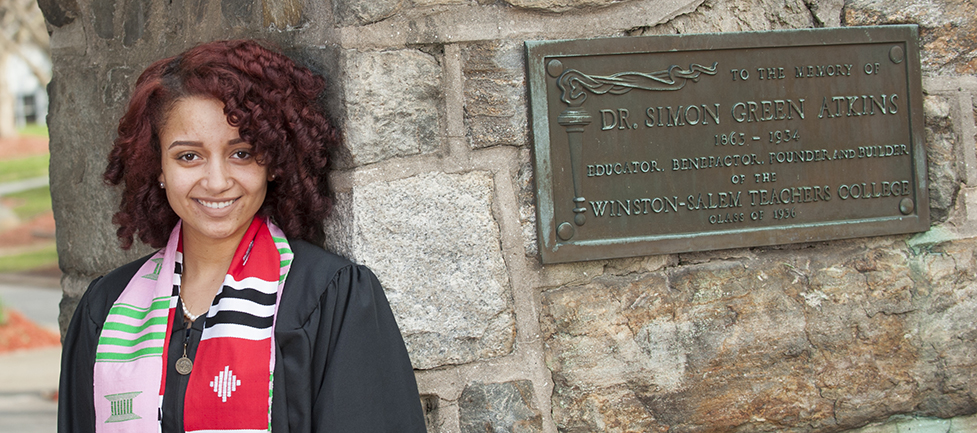The WSSU DNP is FULLY ONLINE! The Doctorate of Nursing Practice, or DNP, prepares graduates to translate evidence-based care into practice, to improve systems of care, and to measure patient, population, and community outcomes. DNP graduates are prepared to function at the highest level of advanced nursing practice. We offer two pathways to the DNP degree: BSN-DNP and MSN-DNP.
The BSN to DNP curriculum is a 78 semester-hour (minimum of 1182 clinical hours) program of learning that prepares nurses for entry into advanced practice with a clinical focus in the Family Nurse Practitioner area of specialization as well as DNP competencies. FNP graduates are eligible to sit for the American Association of Nurse Practitioners (AANP) or American Nurses Credentialing Center (ANCC) National Family Nurse Practitioner Certification exam. The DNP courses are completely online with synchronous and asynchronous delivery.
Plan of Study
The MSN to DNP is designed for nurses who hold a master's degree in advanced nursing practice: nurse practitioner, nurse midwifery, clinical nurse specialist, nursing informatics, nursing administration or nursing leadership. The MSN to DNP curriculum is a 33 semester-hour (minimum of 510 clinical hours) program of learning designed to equip advanced nursing practice with DNP competencies in their area of specialization. This curriculum requires 2 years beyond the MSN program completion (5 semesters: fall, spring, summer, fall, and spring). All courses are completely online with synchronous and asynchronous delivery.
Plan of Study
Ready to advance your nursing career?
Register Now
- Nurse Practitioner
- Psychiatric Nurse
- Nurse Educator
- Certified Nurse-Midwife
- Nurse Anesthetist
- Clinical Nurse Specialist
- Chief Nursing Officer
- Advanced Pathophysiology
- Advanced Pharmacology
- Health Care Policy, Organization and Finance
- Organizational and Systems Leadership in Health Care
Frequently Asked Questions
The Doctor of Nursing Practice (DNP) degree was adopted by the Association of Colleges of Nursing (AACN) in response to a number of societal, scientific, and professional developments. Among these, the nursing shortage and the crisis in the health care system have collectively called for a major paradigm shift that will empower the advanced practice nurse to respond to these developments as they evolve over time. The DNP degree represents the attainment of the highest level of preparation in specialty nursing practice.
You can apply to the DNP program with either a bachelor’s or master’s in nursing degree. The BSN must be from a nationally accredited program and if you apply while in the last year of your BSN program, you must demonstrate you meet graduation requirements. A Master’s degree in nursing in advanced nursing practice: nurse practitioner, nurse midwifery, clinical nurse specialist, nursing informatics, nursing administration or nursing leadership major accredited by the Commission on Collegiate Nursing Education or the Accreditation Commission for Education in Nursing, Inc. (ACNE). If you apply while in the last year of your MSN program you would need to demonstrate that you meet graduation requirements.
The BSN to DNP option generally takes three years and courses are offered in 6 semesters and 2 summers. The MSN to DNP option generally takes two years and 1 summer and can be completed in 4 semesters and 1 summer. Part-time study is available for the MSN option.
Yes, (synchronous and asynchronous).
No. A DNP Quality Improvement project is required which is a synthesis of courses taken in the DNP program and the practice immersion experiences. Students have two options for reporting the completion of the DNP Project. Students may complete one peer reviewed manuscript which comprises the DNP Project report or the student may complete the thesis option with three (3) chapters.
No on campus meeting. For the BSN to DNP option, classes meet via Zoom twice a week. For the MSN to DNP option, classes meet via Zoom once per month, per course (4 intensives per course in the Fall and Spring semester and 3 intensives per course in the summer).
In the first two years BSN to DNP students typically participate in clinical experiences 2 days per week. In year 3 for BSN to DNP students and year 1 for MSN to DNP students clinical experiences typically can be completed in 1 day per week. Clinical experiences can be completed locally if students negotiate a clinical site. For MSN to DNP students, these experiences may be completed in your place of employment or a local negotiated clinical site.
The tuition information can be found on the Student Accounts and Cashiering website pages.
Yes. You must complete the FAFSA application to see if you qualify for grants and/or loans. You should also check the College Foundation of NC website.
WSSU Nurse Faculty Loan Program: This program is available to Master of Science in Nursing (MSN) and Doctor of Nursing Practice (DNP) students who are – or plan to be – nurse educators or advanced practice registered nurse (APRN) preceptor. Learn more...
Application Deadline
To be considered for early admission to the Graduate Nursing program, applicants must submit a complete application by February 15th for Fall admission. The final date to be considered for Fall admission is June 30th.
Once a year, in the Fall semester. Please note only completed applications will be considered for admission.
The Nursing programs are accredited by the Commission of Collegiate Nursing Education and are accepted in all states and jurisdictions for meeting educational requirements for licensure and certification by way of compact designation or applying for reciprocity in a state outside the compact designation. See the Professional Licensure Disclosure Statements page for a list of state-by-state information.
NEXT STEPS
Go ahead... take the next step. Ignite your passion, discover your strength, and prepare to make a difference in the world. There is no ceiling to what you can do at WSSU. #BeTheNext

Nursing was not an easy program to complete, and I still consider it one of my greatest accomplishments, but these educators worked extra hard to ensure their students' success and I am forever grateful for their devotion to their students.


